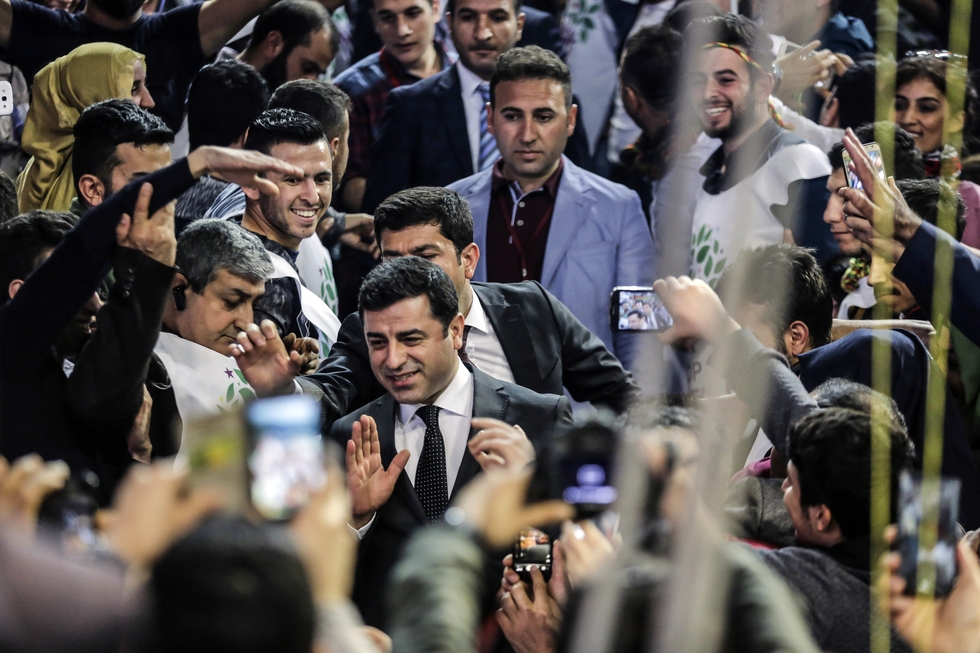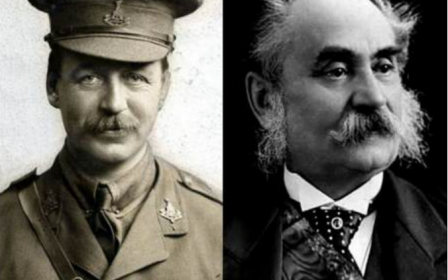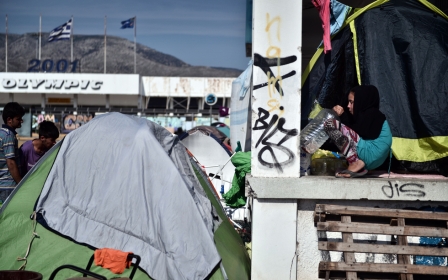Kurds could give up on democracy if MPs' immunity ended, warns HDP

Young Kurds could “lose all hope in democratic politics” if the Turkish parliament votes this week to strip MPs of parliamentary immunity, the co-leader of Turkey’s pro-Kurdish party warned on Tuesday.
His warnings come as parliament began to debate the controversial bill which many believe will be used to target Kurdish MPs.
Speaking to the Guardian, Selahattin Demirtas, co-leader of the pro-Kurdish, left-wing Peoples' Democracy Party (HDP), said that if Kurdish MPs end up in prison, young Kurdish and left-wing activists would turn to militancy and violence.
“If parliamentary politics are closed down, people will turn towards other ways [to make themselves heard],” said Demirtas.
“It is already difficult to speak of peace in a time when Kurds are under such immense pressure. Many of our voters are giving up on hopes of peace, and some youngsters want me to use harsher language against a state they believe is only interested in war."
In order for the bill to pass, 367 MPs out of the body's 550 will have to vote in favour of ending immunity for MPs with outstanding cases against them. If the bill wins only 330 votes, it could be put to a referendum.
Though MPs from all four of the parliament’s political parties are covered by the bill to lift immunity, the move is seen as primarily aimed at the HDP, who have 278 prosecution outstanding against their politicians for a range of offences that include insulting the president, supporting declarations of autonomy and promoting terrorism.
MPs are currently immune from prosecution, but prosecutors are able to file “dossiers” against them, which can come into effect after they leave parliament (or if immunity is lifted). If passed, the move will apply only for MPs with current dossiers against them and will not apply to MPs in future.
HDP politicians have frequently faced calls to be prosecuted for supporting “terrorism”, with many alleging links between the group and the outlawed Kurdistan Workers Party (PKK) who are currently embroiled in violent clashes in Turkey’s southeast - allegations the HDP deny.
Both the main opposition centre-left Republican Peoples Party (CHP), and the far-right Nationalist Movement Party (MHP) officially support the bill. However, as the ballot will be held in secret many are expected to break with the party line, particularly in the CHP.
CHP Istanbul MP Sezgin Tanrikulu, a former deputy chair of the party, has raised his objections to his party’s decision to support the move.
“I do not approve of discussing immunities by getting locked up by the AKP's engineering of political interests and agenda; full stop!” he wrote on Twitter last August.
A number of CHP MPs face prosecution for insulting President Recep Tayyip Erdogan, including leader Kemal Kilicdaroglu who recently called Erdogan a "sexual and political pervert".
Ankarali Jan, a Turkey-based analyst said that the bill’s future was uncertain.
“It may not [pass], given how many MPs would be affected by the move, but if there's not a big rebellion in the CHP, I guess it will,” he told Middle East Eye in a recent interview.
The CHP have 138 prosecution requests against them, while the MHP and AKP have 12 and 48 respectively.
Jan added that, once immunities were removed, “almost certainly most of those convicted would be HDP over terror offences.”
Ziya Meral, a researcher with a focus on Turkey, said that it was likely that the move to lift MPs’ immunity would be abused for political gain.
"In principle I support lifting all immunities, except for speeches in parliament," he told MEE.
"But in practice this will be used for political reasons, and selectively. Thus, it might not result as a positive development for Turkey."
However, he said that although the actions of some HDP MPs were deserving of prosecution, Turkish counter-terrorism laws needed "reform" and had to move away from prosecuting "non-violent opinions".
Some analysts have seen the stripping of parliamentary immunity as a means for the AKP to secure itself against future elections losses - the HDP and AKP often attract votes in the same areas - and pave the way for Erdogan’s desired presidential system.
Jan said that although imprisoning HDP MPs would not change the make-up of the parliament at this stage, it would still deal a major blow to the party.
“The HDP won't be of much use in parliament if 90 percent of their MPs are in jail,” he said.
“If the AKP chooses to hold another election, this could be their insurance against the HDP getting back in.”
He added that the AKP was unlikely to seek to have the party officially banned, as such a move could leave the AKP vulnerable to being threatened with dissolution itself. In the past, the AKP has faced accusations that it undermines the secular values of the republic.
“They changed the rules to make dissolution almost impossible after a case to dissolve their party went all the way up to the constitutional court and was rejected by only one vote in 2008,” Jan said.
“So this is their way of making sure that those who oppose them suffer without putting their own existence into question.”
Middle East Eye propose une couverture et une analyse indépendantes et incomparables du Moyen-Orient, de l’Afrique du Nord et d’autres régions du monde. Pour en savoir plus sur la reprise de ce contenu et les frais qui s’appliquent, veuillez remplir ce formulaire [en anglais]. Pour en savoir plus sur MEE, cliquez ici [en anglais].





